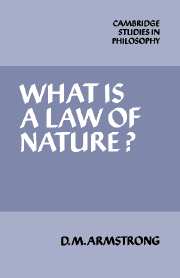Book contents
- Frontmatter
- Contents
- Acknowledgements
- PART I A critique of the Regularity theory
- PART II Laws of nature as relations between universals
- 6 Laws of nature as relations between universals
- 7 Functional laws
- 8 Uninstantiated laws
- 9 Probabilistic laws
- 10 Further considerations concerning the form of laws
- 11 Are the laws of nature necessary or contingent?
- Conclusions
- Works cited
- Index
8 - Uninstantiated laws
Published online by Cambridge University Press: 05 June 2012
- Frontmatter
- Contents
- Acknowledgements
- PART I A critique of the Regularity theory
- PART II Laws of nature as relations between universals
- 6 Laws of nature as relations between universals
- 7 Functional laws
- 8 Uninstantiated laws
- 9 Probabilistic laws
- 10 Further considerations concerning the form of laws
- 11 Are the laws of nature necessary or contingent?
- Conclusions
- Works cited
- Index
Summary
In the previous chapter an account of uninstantiated laws was given. According to this view, strictly there are no uninstantiated laws. Statements of uninstantiated law tell us that a certain law would govern the antecedent universal, if, contrary to fact, that universal existed, that is, was somewhere instantiated. Such an account deals fairly easily with the problem of ‘missing values’ of functional laws. But certain cases of uninstantiated laws have been suggested by Michael Tooley (1977) which the counterfactual account appears to be unable to handle.
TOOLE'S CASES
The cases to be discussed are not actual uninstantiated laws proposed by scientists. They are imaginary situations where, it is plausible to say, we should be inclined to postulate uninstantiated laws. Tooley himself was not concerned with the topic of uninstantiated laws for its own sake. Rather he wanted to use the cases, first to criticize the Regularity theory, and second to support the view that laws of nature are relations between universals. I largely followed him in his estimation of the cases in my 1978 (Ch. 24). Now I have doubts.
The Fundamental Particle case (1977, p. 669). Tooley imagines a world containing ten, and only ten, types of fundamental particle. Allowing that a particle may interact with a particle of its own type as well as with particles of other types, this allows for 55 interaction, laws governing the interaction of pairs of particles. Suppose that 54 of these laws are known.
- Type
- Chapter
- Information
- What is a Law of Nature? , pp. 117 - 127Publisher: Cambridge University PressPrint publication year: 1983



